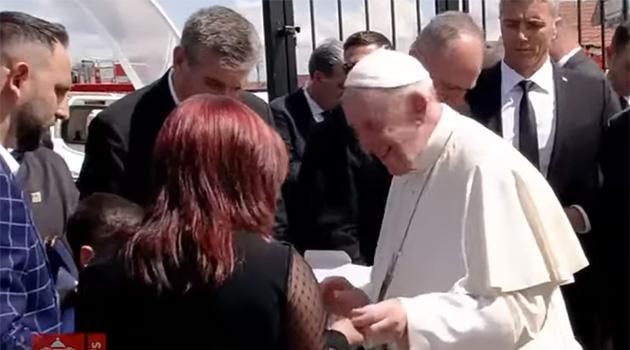President of Slovakia Zuzana Čaputová posts in Romanes for Roma Holocaust Memorial Day: Te e historija na avel pale kampel te achaľol, so hin ňenavisť

On the occasion of Roma Holocaust Memorial Day, Zuzana Čaputová, the President of the Slovkak Republic, has met with Adela Maková, who was just one year old when the Hlinka Guard murdered her father, who was a partisan, during the Second World War. Čaputová also posted to Facebook a Romanes-language text commemorating the Holocaust of the Roma.
“It is said that the Holocaust of the Roma, the memory of the victims of which we are commemorating today, is unrecognized and little-documented. That makes it all the more precious to preserve the memories of people whose forebears experienced the Roma Holocaust and can testify to those inhuman deeds. At my meeting with Mrs. Adela Maková from Badín, I heard her tell the stories that her mother and grandmother used to tell about their immediate family. She was just one year old when the Hlinka Guard killed her father, a partisan,” Čaputová said.
“She also told me how Romani people at the end of the war would be captured by the Hlinka Guard in the streets and executed in Kremnička. Those who were murdered left behind orphans. Romani people could only recognize their loved ones by their clothes when the mass graves were exhumed after the war. Her stepfather survived two concentration camps and never wanted to speak about those memories in front of his family and children,” the President of the Slovak Republic has posted.
“For this history to never repeat, it is necessary to understand what hatred, humiliation and discrimination mean for the specific individuals and their families that experience it. We must understand that it is possible to slide from words bolstering prejudice and hatred to the act of committing murder. We will never forget!” Čaputová posted.
Pal o romano porajmos, saveskeri pamjatka marde manušen peske ada ďives leperas, pes vakerel hoj hino na prindžardo u čino zdokumendovindo. Kaleske barvaleder hin te ľikerel o manušengere leperibena, savengere o phureder familijakere manuša džiďile andro romano porajmos u vakeren pal o namanušikane buťa.
Pro kidipen la raňaha Adelaha Makovaha le Baďinostar me šunavas, vakeribena, save lakeri daj u phuri daj vakerenas u save sas pal lakeri famelija. Sas la ča jekh berš, kana o gardisťi murdarde lakere dades partizano. Vakerelas mange the oda sar le Romen pro agor le bare maribnaske o gardisťi chutkernas pre ulica u murdarenas len Kremňičkate.
Sar pal o murdarde ačhile o siroti. Sar o Roma prindžarkernas peskere manuša pal o mariben paš e ekshumacija andro masovo hrobi pal o gada. The pal koda sar lakero otčimo, savo predžiďila duj koncentračno tabora pal akala leperibena na kamelas ňikdaj te vakerel. Phenďa mange the pal peskero dživipen, sar len khere na sas love pre škola u sar 14-beršengeri geľa te kerel buťi sar prjadka andro zavodos Slovenka, sikhaďa mange lil savo pisinďe pal koda sar zorales kerelas buťi. Sar kana pal e maťersko o čhave gele andre škola, kerelas buťi sar sanitarka pre Darcovsko staňica rateskeri andre Banská Bystrica. Sar lakere čhave u lakere vnuki agorisarde o učhe školi u sar hiňi pre lende bari barikaňi. Bares peske mangel, te o manuša peske arakhen ke peste drom achaľuvibnaskero, te o žuže manuša u čhavore na šunen dar, la ňenavisťatar u le maribnastar, savi joj sar cikňori predžiďiľa.
Te e historija na avel pale kampel te achaľol, so hin ňenavisť, te čhivel varekas tele u diskriminacija konkretno manušen u lengere familijen, save la dźiven. U sar pes del te perel le lavendar save ľikeren predsudki u ňenavisť ži ko murdaripen.
Ma bisteras!
Tuesday, 2 August marks 78 years from the tragic night in 1944 when the Nazis murdered those imprisoned in what was called the “Gypsy Family Camp” at Auschwitz-Birkenau. In the gas chambers of the concentration camp, despite active resistance, they murdered as many as 4,300 Romani people into the early morning hours of 3 August, according to the most recent studies.
The Polish Parliament established 2 August as that country’s official Annihilation of the Roma and Sinti Memorial Day in 2011. In 2015, the European Parliament recognized 2 August as the European Memorial Day of the Holocaust of the Sinti and Roma.
During the 17 months of the existence of what was called the “Gypsy Family Camp” at Auschwitz-Birkenau (from February 1943 to July 1944), 23,000 children, men and women were imprisoned there. Approximately 21,000 prisoners of Roma and Sinti origin died in the camp.
Other imprisoned Roma were murdered in the concentration camps of Bełżec, Chełmno, Majdanka, Sobibór and Treblinka. Still others, the number of whom it is difficult to estimate, were shot to death and buried in mass graves in the forest.
The extermination policy of Nazi Germany led to the deaths of an estimated half a million Roma and Sinti from all over Europe. Some estimates put the number as high as 800,000 victims, or anywhere between one-quarter and one-half of the prewar population of Roma.
